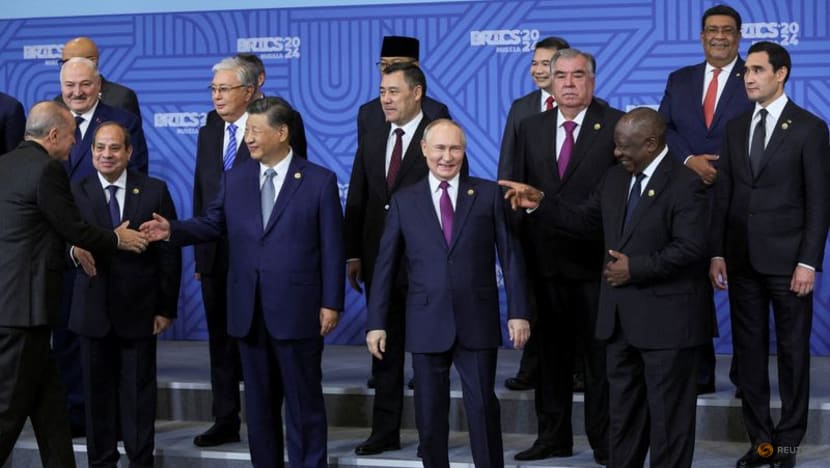Expanded BRICS grouping is the start of ‘a different kind of international order’, says expert
Emerging economies are playing the field by siding with the United States and its allies one day, and Russia and China the other, says a professor of international affairs.

Russian President Vladimir Putin and participants in the outreach/BRICS Plus format meeting pose for a family photo during the BRICS summit in Kazan, Russia, 24 October 2024. MAXIM SHIPENKOV/Pool via REUTERS

This audio is generated by an AI tool.
The expanded BRICS, which was formed to act as a counterweight to the West, is the “beginning of a different kind of international order”, an expert said on Friday (Oct 25) as the grouping’s three-day summit in Russia came to a close.
The bloc - which originally comprised Brazil, Russia, India, China and South Africa - added 13 partner countries on Wednesday (Oct 24).
These include four Southeast Asian nations: Malaysia, Vietnam, Indonesia and Thailand.
“The most important takeaway … is that you now have a very large number of countries in what we call the Global South, the emerging economies - India, Brazil, Turkey, Indonesia - many countries that are now playing the field,” said Charles Kupchan, senior fellow at United States-based think tank Council of Foreign Relations.
“They're hedging their bets. One day, they're siding with the United States and democratic allies. The next day, they're siding with Russia and China,” he told CNA’s Asia First.
“That's the world that we're headed into, in which many countries in the Global South are … not going either with a Russia-China coalition or a US-led coalition,” he added.
There is a clear signal on how BRICS wants to go ahead with its growth, said Ambassador Rajiv Bhatia, distinguished fellow of the foreign policy studies programme at India-based think tank Gateway House.
“They have taken the view that there is a need to have a new category of dialogue partners for BRICS,” he added.
RUSSIA’S RETURN TO THE WORLD STAGE
The summit was a “coming out party of sorts” for Russian President Vladimir Putin, who has been ostracised for the country’s invasion of Ukraine in 2022 said Kupchan, who is also professor of international affairs at Georgetown University in Washington.
He noted that more than 30 countries were present at the meeting, with 20 represented by their leaders, including China, Turkiye and India.
“That shows that Vladimir Putin is not isolated on the global stage, nor are the sanctions imposed by the United States and its allies, really severing Russia from the global economy,” he said.
However, he noted that Putin did not get any backing on the war.
“Countries are more or less holding their nose, working with Russia, talking to Russia, but they would all love to see this war end and end the disruptions to the supply chains that the conflict has caused,” he said.
The collective message from the BRICS members to Russia was that the conflict must be brought to an end, and that the way forward for that is for nations to sit around a table and talk to each other in a constructive manner, said Bhatia.
WHAT BENEFITS ARE COUNTRIES LOOKING FOR?
BRICS is emerging as a platform for the emerging markets and developing economies, added Bhatia.
“They call themselves key MDCs (more developed countries). And here, they are particularly focused on protecting the interests of the developing countries, the real members of the Global South,” he said.
Among the benefits BRICS members would like to see is lower grain prices arising from a new international grain exchange proposed by Russia, the world’s largest wheat exporter.
BRICS members are among the world's largest producers of grains, legumes, and oilseeds.
“They are suffering from the increased prices of food and fuel and fertilisers,” Bhatia noted.
“So in that context, the grain exchange programme, and also other measures to improve agricultural production and trading in agriculture … would be significant aspects of economic cooperation on BRICS member states.”
The member economies represent over US$28.5 trillion or about 28 per cent of the global economy.
“The commonality here is that they would like to see a global governance system that is more equitable, in which the Global South has more say and receives a greater share of the benefits,” Kupchan said.
“Russia and China are attempting to say that they are leading the charge for that more just international order.”
However, the claim is “more rhetoric than it is reality” as the organisation is in its very early form, he added.
If there is a winner from within the grouping, it is India, said Kupchan.
He noted that a meeting between Chinese President Xi Jinping and his Indian counterpart Narendra Modi at the BRICS summit led to a thawing in their relations, and a pact to resolve border issues.
Kupchan pointed out that India sits in the Shanghai Cooperation Organization, which was established by China and Russia in 2001. But at the same time, it is also in the the US-led Quad grouping, which is meant to hedge against the rise of China.
“What we're seeing in the Kazan meeting is a glimpse of what's to come - a much more complicated international landscape, what you might call variable geometry, not the two-bloc world that we saw during the 20th century,” Kupchan added.

















